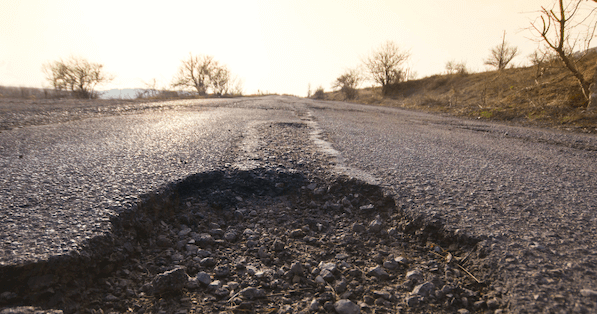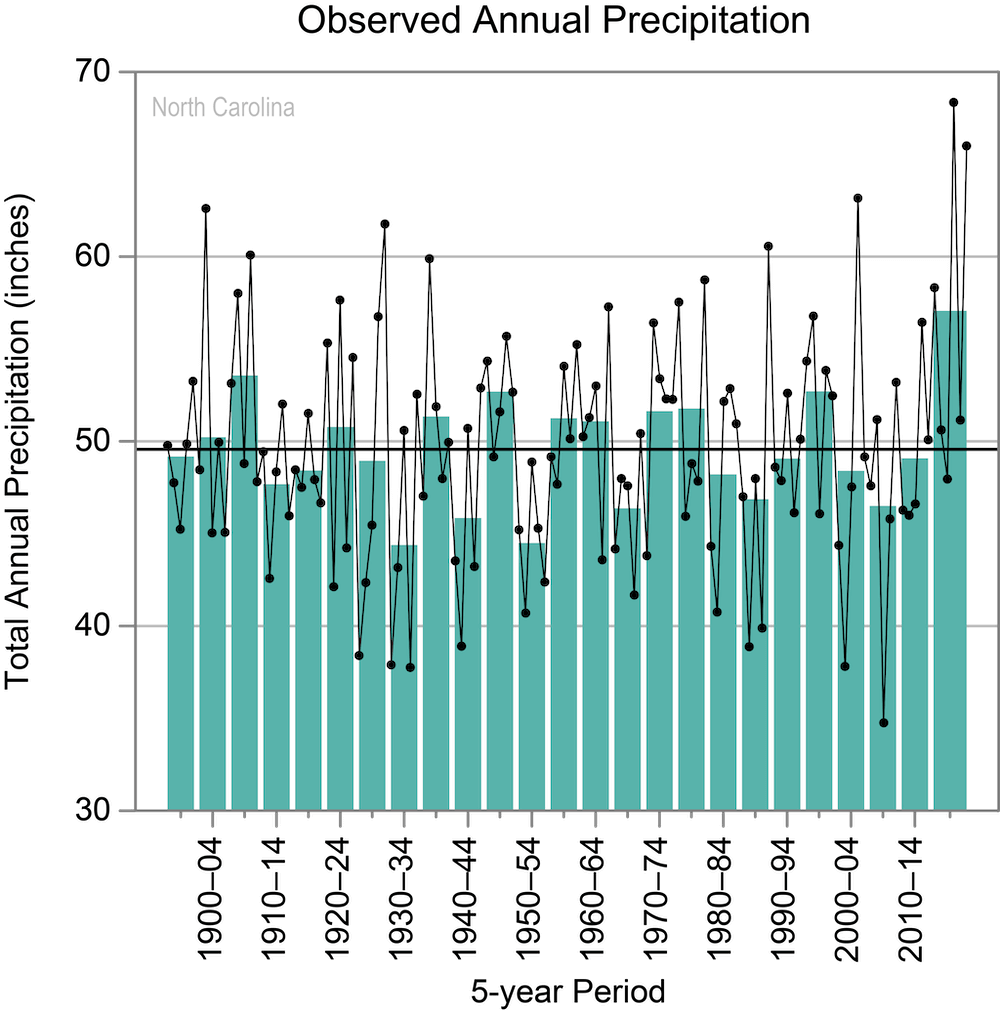Pothole Causes, Solutions, and Mechanic Insight
Auto Shops Located in: Chapel Hill, Durham, Taleigh, Apex, and Cary North Carolina

Potholes have seemed to become an epidemic across the nation. Drivers come in almost every day with trouble from roads. Some issues, like alignment troubles, can build over time. Other damage, like bent rims, can come on suddenly. However, potholes remain a constant nuisance. So, what causes potholes? What can you do about it? Our local mechanics are here with insight.
What Causes Potholes?
Smooth asphalt is unlikely to face any direct impact in the middle of the street. So how do potholes form? The answer starts at the “roots” of our roads. On the surface, we see strong, industrial, unbreakable asphalt. However, deep beneath the pavement is soil ready to cause trouble.
All potholes start with rain. Moisture can collect in the ground under the asphalt—seeping into the sand or dirt through small cracks in the road. This rain leads to three different causes of potholes:
- Water can start eroding the underlying soil, leaving patches in the road’s structural support. Then, when a heavy truck or constant traffic stresses the patch of road, it can cave in—creating a new pothole.
- We can also see tree roots and other vegetative regrowth begin seeking out the moisture collecting under the asphalt, impacting the road’s structural integrity.
- In other cases, freezing weather can cause the water to expand. When the ice thaws, it leaves a cavity in the pavement. As traffic drives over this cavity, it will cave in—creating a new pothole.
The Current Pothole Trends
Why are potholes everywhere? Extreme weather conditions, staffing shortages, high traffic, and supply chain issues are some of the problems contributing to the predominance of potholes on the roads today. There are five main reasons we are seeing an increase in potholes in recent years.
1: Changes in Traffic Patterns
For a low-traffic road, asphalt can last 25 years or more. However, as home development efforts continue with intensity throughout the country, even smaller backroads are seeing more movement. Naturally, this causes more pavement wear and tear, increasing the frequency of potholes.
2: Supply Chain Issues
In 2021, supply chain issues led to a shortage of asphalt—delaying road projects and leaving potholes unfilled. This issue caused government officials to fall behind on pothole filling. With potholes becoming more prominent while repair efforts fall behind, officials cannot seem to catch back up.
3: Change in Weather Patterns
As mentioned above, all potholes start with rain. In North Carolina, recent years have brought some of the highest levels of heavy rain the state has ever reported. More rain naturally leads to an increase in potholes. The 2022 NC Climate Summary provided the following chart, which clearly displays record-high precipitation in the 2015-2020 bar. The charts are updated in 5-year intervals, with the next update coming in 2025. However, we have continued to see high precipitation levels across the state, and experts expect this number to continue rising.

4: Underreporting of Potholes
As we explain below, patching a pothole starts with a report to the NCDOT. However, the predominance of potholes can create a type of bystander effect. If all drivers assume someone else has already reported a severe pothole in the area, you might find that nobody ever actually reports it. In other cases, many drivers can fall into a negative mindset that leads to underreporting. You might think, “It is useless—there are too many potholes to report.” When drivers accept the fate of a bumpy commute, roads are less likely to get the help they need.
5: Pavement Life Cycles
Healthy pavement can last 25+ years without issue. However, all of the above concerns will shorten the asphalt lifespan. Additionally, we encourage you to look up when the state built pothole-covered roads in your area. You are likely to find that they are naturally reaching the end of their lifespan.
The Dangers of Potholes on the Road
Whether they make you spill your coffee or wake the baby sleeping in the backseat—we have all been inconvenienced by potholes on the road. However, beyond just personal inconveniences, potholes can cause costly vehicle damage, including:
- Bent rims
- Scratched rims
- Leaking fluid
- Alignment troubles
- Tread separation
- Tire flats or blowouts
- Tire bubbling
- Sidewall damage
- Punctures in tires
- Shock or suspension issues
- Uneven tread wear
How to Tell If Your Car Has Pothole Damage
After driving over a huge pothole, have you ever noticed your car immediately fall silent? Perhaps this is our way of instinctually listening for an issue. Here is a look at the signs your vehicle experienced pothole damage:
- Feel it out: If your tire experiences a blowout, the damage will be immediate and noticeable. However, pothole damage often comes in more subtle internal signs. For example, steering wheel shaking can signify pothole damage with your alignment or suspension system.
- Visual inspection: Take a look at your tires and the bottom of your car after hitting a pothole. Do you see any signs of an issue? Some problems, like tire bubbling, will be obvious.
- Visit a mechanic: The safest option is to have a professional take a look at your vehicle. Experts can diagnose potential issues. They can also advise whether or not you have a possible case for apparent pothole damage.
Should I Fill In My Local Potholes?
In recent news, former California governor Arnold Schwarzenegger took matters into his own hands: filling a pothole near his home. While drivers might rejoice in this decision, it can actually have serious consequences:
- Potential Dangers: Road work can be dangerous. The government can shut down lanes and re-route drivers to maintain safe transportation during road repairs. Without the right precautions, you could create car accidents or risk personal injury trying to repair a road yourself.
- Delaying Real Repairs: It can be hard to fill a pothole to professional standards. Sometimes, your DIY solutions could delay long-lasting professional repairs—as experts will need to undo your work before starting. In other cases, you might actually make the pothole worse by trapping moisture under the asphalt. This water will expand during the following winter freeze, bringing the pothole back larger than before.
- Personal Liability: You may be personally liable if an imperfect pothole fix causes any trouble. For example, underfilling a pothole could allow surface-level water collection while preventing the water from seeping through the cracks and into the ground. This change in your road’s structure could increase the risk of hydroplaning and car accidents.
- Mistaken Potholes: Or, as in the case of Arnold Schwarzenegger, the pothole may not be a pothole at all. The former governor actually filled in a service trench required to complete vital gas line repairs.
No news yet on whether or not Arnold Schwarzenegger had to pay to have the service trench dug again. However, the reward is not worth the risk of filling potholes yourself.
What Can You Do About Potholes?
While you can’t fill a pothole in yourself, there are some steps you can take to keep your car protected:
- Always report potholes on the road to your local authorities.
- Make sure your tires are properly inflated. Low tire pressure will leave you more prone to rim damage from potholes, while overinflated tires make it likely you will experience a tire blowout.
- Drive slowly over known potholes.
- While it might go without saying, avoid these hazards on the road when you can. For example, if you know the highway’s right lane has a severe pothole, remind yourself to drive in the left lane until the coast is clear.
- Consider finding an alternative route to your destination for severe and unavoidable potholes until the repairs are completed.
- Make sure you are keeping up with regular maintenance and vehicle inspections. If you are hitting frequent potholes, you should get your alignment checked for free at a local mechanic. This inspection can prevent more extensive damage from spreading, like uneven tire wear. Regular maintenance can also help you affirm to government officials or your insurance company that the damage was, in fact, caused by potholes. So, let’s take a closer look at how you can get repayment for pothole service repairs.
How to Save Money on Pothole Repairs
Before you delay getting significant repairs caused by pothole damage, you should know these repairs may be covered for free. However, before we dive in, it is worth noting that you should visit a mechanic as soon as you experience pothole damage.
- Immediate action will help keep your claim valid. If you file a property damage claim to the government after the pothole has been filled, it is more likely that your claim will be denied—even if you otherwise qualify for compensation.
- If you continue driving on a damaged tire, for example, it could create even more vehicle damage that will not be covered.
- In some cases, you might need a mechanic to attest that the damage to your vehicle was consistent with pothole damage. Additionally, you might need to have paid the costs to verify the final total for a claim.
Will Insurance Cover Pothole Problems?
Yes, some car insurance policies—like collision insurance—will cover pothole damage. In these cases, you would simply need to pay your deductible. It is worth checking with your insurance agent to see if your vehicle can be repaired for free.
Will the Government Cover Pothole Damage?
In some cases, your pothole damage may be covered by your local government. There are three noteworthy considerations here:
- First, is the road state-maintained? A majority of roads are owned and maintained by the government. However, subdivisions and residential streets are often privately owned. For example, your home’s road might belong to the community and receive maintenance under the HOA.
- Second, was the pothole reported to the local government? NC drivers can click here to report a pothole. Claims are only valid if this was a known, reported pothole.
- Finally, how long ago was the report filed? The government requires a reasonable amount of time to respond to pothole reports before they can be held accountable.
If a pothole was reported without reasonable action from the government, officials might take responsibility for the damage it caused. North Carolina drivers can click here to file a property damage claim to the NCDOT.
Pothole Damage Repairs at Chapel Hill Tire
If a pothole has damaged your car or tire, visit our local mechanics. We will diagnose any issues and complete the repairs your vehicle needs. Our tire specialists can also help provide the verification you may need to validate your claim for coverage.
We proudly serve the greater Triangle area with our 10 locations across Cary, Apex, Raleigh, Chapel Hill, Carrboro, and Durham. Our expert mechanics also commonly serve surrounding communities, including Knightdale, Pittsboro, Wake Forest, Hillsborough, Morrisville, and beyond. We invite you to make an appointment or give us a call to get started today!















